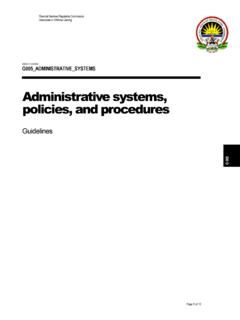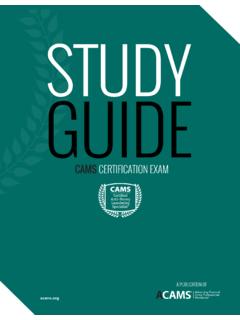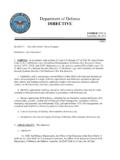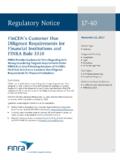Transcription of FINANCIAL SERVICES REGULATORY COMMISSION ANTIGUA …
1 FINANCIAL SERVICES REGULATORY COMMISSION ANTIGUA AND BARBUDA DIVISION OF GAMING INTERACTIVE GAMING AND INTERACTIVE WAGERING EXAMINERS HANDBOOK ANTI-MONEY LAUNDERING COMPLIANCE PROGRAM FOR INTERACTIVE WAGERING AND INTERACTIVE GAMING COMPANIES INTRODUCTION FINANCIAL Institutions operate in a dynamic environment driven by industry consolidation, emerging technology, and market globalization. All these forces together can create inherent risk. In order to deal with this risk, a gaming company must develop and maintain a sound compliance management system that is integrated into its overall risk management. Ultimately, compliance should be part of the daily routine of management and employees of any FINANCIAL institution. COMPLIANCE POLICY AND PROGRAM All gaming companies licensed within our jurisdiction should comply with the relevant regulations and anti-money laundering laws (Interactive Gaming & Wagering Regulation and FINANCIAL Action Task Force on Money Laundering and Terrorist Financing).
2 Regardless of size, a well designed, implemented and monitored program will provide a strong base for compliance. These components must be made in accordance with our laws that govern all FINANCIAL institutions and consideration must be given to the internal policies of the company. A compliance program must be in writing, as it represents an essential source for training and a reference tool for all staff. Additionally, during periods of expansion and staff turnover, a written compliance program becomes more important because individual with experience and knowledge may no longer be with the company. A well implemented and maintained compliance program will prevent or reduce money laundering and provide cost efficiencies. It is known that no two compliance program will be identical, and that the requirement of the program will be based on the SERVICES offered by the FINANCIAL institution.
3 Regardless of how formal the company s compliance program is all gaming companies are expected to be proactive in managing their compliance. Compliance efforts require an ongoing commitment from all levels of senior management and should be part of the company s daily operations. A sound compliance program is essential to the efficient and successful operation of the company. ANTI-MONEY LAUNDERING COMPLIANCE PROGRAM FOR INTERACTIVE WAGERING AND INTERACTIVE GAMING COMPANIES 3A company compliance program must: Implement Internal policies, Procedure and Control, Appoint a Compliance Officer, Train all Staff Monitor of all transaction INTERNAL POLICIES AND PROCEDURES Money Laundering techniques are ever changing, therefore, compliance policies and procedures should be described, reviewed and most importantly be updated so as to reflect changes in the industry and the REGULATORY environment.
4 Policies should be established with goals, objectives and suitable methods for meeting those goals and objectives. An institution s policies and procedures must provide personnel with the necessary information needed to perform their responsibilities. This shall include applicable regulations and laws cited and definitions, sample form with instructions, institution policy, and when necessary directions for routing, reviewing, retaining transaction documents. Compliance policies and procedures are the means to ensure consistent operating guidelines that will support your company in complying with relevant laws and regulations. The policies and procedures are developed and implemented to detect and control money laundering. Furthermore, these criteria will provide standards by which your compliance officers and line managers may review your operations.
5 The Policy requires that each company must: Act in accordance with the relevant laws and regulations Adhere to records keeping requirements (6 years) Ensure Identification and Verification of Customer Ensure monitoring of customers account and activity Identify Compliance Officer within the FINANCIAL institution ANTI-MONEY LAUNDERING COMPLIANCE PROGRAM FOR INTERACTIVE WAGERING AND INTERACTIVE GAMING COMPANIES 4 Report all suspicious activity and significant transaction to the proper authority (in this case ONDCP) and copied the REGULATORY COMMISSION Cooperate with law/ REGULATORY enforcement officer(s). TRAINING Education of the company s board of directors, management, and staff is essential to maintaining an effective compliance program. A compliance program can only be effective if the employees of the company received the necessary training to be able to detect money laundering.
6 All staff should receive precise, extensive training in laws and regulations, and internal policies and procedures that affect their jobs. The compliance officer should be responsible for compliance training and to establish regular training information for directors, management and staff. Training can be conducted in-house or external training programs or seminars. Upon training of all employees, a compliance officer should ever so often assess their knowledge and understanding on how to report, screen and investigate suspicious activities and transactions. Each employee should be asked to sign a form stating that they understand the policies and procedures and have been trained. An effective compliance training program is regularly updated with current, complete and accurate information on your operations, laws and regulations, internal policies and procedures.
7 An effective training program should: Train all employees in anti-money laundering compliance Educate all staff on pertinent laws and regulations Illustrate how SAR/STR forms should be completed Outline steps for reporting suspicious reports Know how to respond appropriately to law enforcement requests MONITORING ANTI-MONEY LAUNDERING COMPLIANCE PROGRAM FOR INTERACTIVE WAGERING AND INTERACTIVE GAMING COMPANIES 5 This is a proactive approach by the company to identify procedural or training weaknesses in an effort to prevent any REGULATORY violations. A compliance officer that is included in the planning, development, and implementation of business proposition will increase the success of its compliance monitoring function. Changes to regulations, or any changes to the company s operations should cause a review of established internal compliance policies and procedures.
8 Monitoring also includes review of daily transactions in order to establish accountability and identifies potential problems in a timely manner. Board members and senior management response to the audit compliance report should be timely. The compliance officer should receive a copy of all compliance audit reports, and take steps to address noted deficiencies and required changes to ensure compliance to laws and regulations. Follow up procedures should be established to verify that remedial actions are effective. COMPLIANCE AUDIT A compliance audit is an independent review of the company s compliance with relevant laws and regulations and adherence to internal policies and procedures. An audit helps management to ensure ongoing compliance and identify compliance risk conditions. It harmonizes the company s internal monitoring system.
9 An audit may be conducted once a year, and may be performed in house or contracted to an accountant. A company that outsources the audit should ensure that the auditor is knowledgeable about anti-money laundering and terrorist financing, and that the program is based on current law and regulation. Regardless of whether audits are conducted by the institution s personnel or by contractor, the audit findings should be reported directly to the board of directors and a copy should be given to the compliance officer, and all recommendations given in the report should be implemented in a reasonable manner. The scope and frequency of an audit should consider such factors as: Organization and staffing of the compliance function Expertise and experience of various company institution personnel Outsourcing of audit function to third party service provider Size of the company COMPLIANCE OFFICER ANTI-MONEY LAUNDERING COMPLIANCE PROGRAM FOR INTERACTIVE WAGERING AND INTERACTIVE GAMING COMPANIES 6 The appointed compliance officer is responsible for the company s anti-money laundering compliance program and all questions concerning these procedures should be addressed to that person.
10 A compliance officer should monitor employee performance to ensure that they are following the company s established internal compliance policies and procedures. The compliance officer is required to: Develop, implement and revise anti-money laundering policies and procedures Monitor and implement the AML program Make certain that all reports are made and records are retained for six (6) years. Provide ongoing Staff Training Prepare, review and file SARs/STRs Report to Company Directors or Senior Management of any compliance issues Report SARs to the relevant Authority. All reports should be copied to the REGULATORY COMMISSION (KYC) KNOW YOUR CUSTOMER/EMPLOYEE Each company is required to structure and implement a sound Know Your Customer program for monitoring of accounts, identification and verification of customers.









